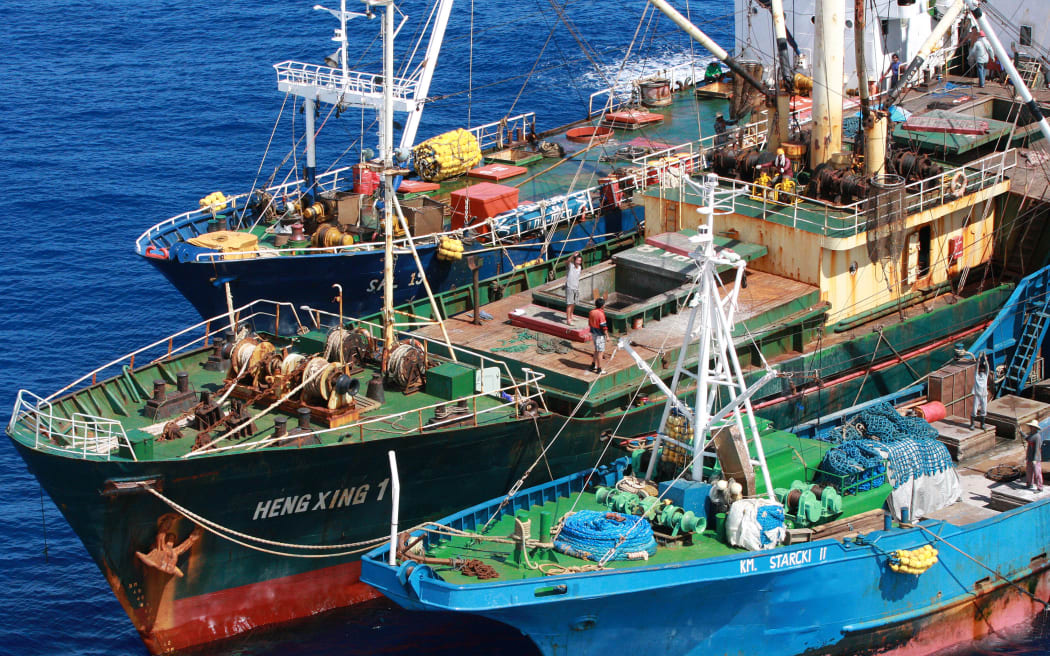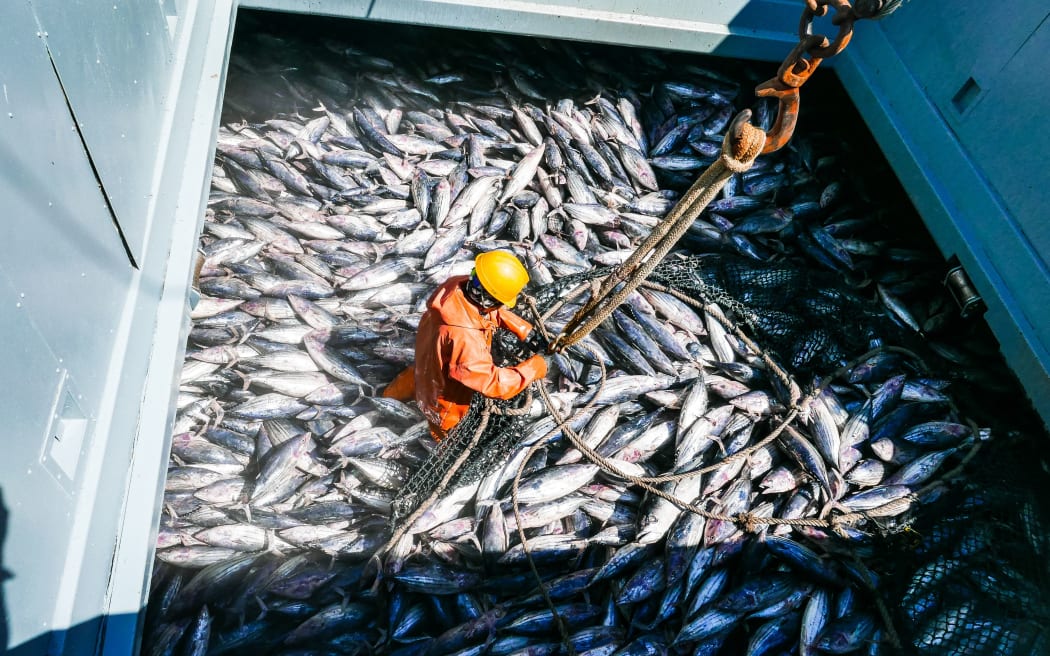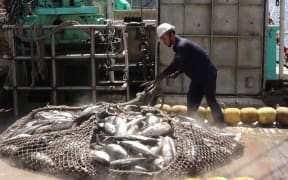
An illegal transshipment is seen taking place on board the ship 'Heng Xing 1' in an area of international waters near the exclusive economic zone of Indonesia. Photo: Shannon Service / Greenpeace
A revised tropical tuna measure was agreed on during the Western and Central Pacific Fisheries Commission (WCPFC) meeting in the Cook Islands, but little progress has been made on tighter monitoring of transshipment that has a reputation for nefarious fishing activity.
The decision was made in Rarotonga earlier this month as 26 member countries and participating territories convened to make rules for the world's largest tuna fishery.
The measure dictates management around bigeye, skipjack and yellowfin tuna.
Pew Charitable Trusts' Glen Holmes said it is arguably the most important piece of management the WCPFC has.
As part of the measure, Fish Aggregating Device (FAD) closure periods in the Western and Central Pacific Ocean were reduced to allow more fishing.

Frozen skipjack tuna being loaded onto a carrier vessel in the Federated States of Micronesia. Photo: Francisco Blaha
FADs are used to attract fish and closure periods mean purse seine fishing vessels cannot fish close by them.
The closure periods have been reduced from five months to two and a half months in both the high seas and exclusive economic zones (EEZs).
Holmes said the change will put more pressure on tuna stocks, but it is not a concern for his organisation because the science says it is okay.
"Essentially, the closures have been halved to what they previously were and that will result in much higher economic returns for the islands who are selling days for the purse seine fleet," he said.
Holmes said "as a trade-off" the longline fleets can also increase how much they can fish but subject to increasing observer coverage - whose job it is to ensure ships are adhering to fishing rules.
Before the meeting, observer coverage for the longline fleet was 5 percent, while the purse seine fleet has 100 percent coverage.
"If they increase it to 10 percent coverage, they will get a 10 percent increase on the amount of bingo that the limited members can catch," Holmes said.
Compliance key
World Wildlife Fund Western and Central Pacific tuna programme manager Bubba Cook said observer coverage should be increased purely on science and compliance - not so longline vessels get more opportunities to fish.
"That's not the reason we should be increasing observer coverage we should be increasing observer coverage on principle alone."
The Forum Fisheries Agency (FFA) director Manumatavai Tupou-Roosen said the new measure was carefully balanced.
In 2022, a management procedure, which is a pre-agreed framework for making fisheries decisions, was adopted for skipjack tuna.
However, environment charities last year were concerned the adoption would not be fully implemented and would be non-binding.
In the revised tropical tuna measure, language has now be inserted to make the skipjack management procedure binding.
Tupou-Roosen said this was an important amendment, especially for MSC certification by the Marine Stewardship Council.
As well as tighter management on skipjack, a new harvest strategy has been put in place for the North Pacific Albacore tuna.
The measure is applicable to the entire Pacific Ocean, with the Inter-American Tropical Tuna Commission agreeing to the same procedure as the WCPFC.
Prior to the meeting, the FFA were seeking more oversight on transhipment - when a ship offloads fish into another ship without coming into port. This practice means there is less oversight and is thought to foster bad fishing behaviour.

Dr Rhea Moss-Christian - The incoming Executive Director of the Western and Central Pacific Fisheries Commission. November 2022 Photo: RNZ Pacific/ Koroi Hawkins
Tupou-Roosen believes electronic monitoring could be a solution if fishing vessels insist that they cannot come into port.
However, there was no revision to the transshipment measure.
"We're disappointed from FFA side that we can adopt the revised transshipment measure, but we do understand that everyone needs to be on board," she said.
"We want to make sure we get it next year."
Holmes said the transshipment measure not being revised was the biggest disappointment of the meeting.
"We thought that this year, there would be some kind of an update, and it would be some modernisation of the measure.
"But there were some members that just didn't want to agree to changing things and so in the end nothing happened."
Coming into the meeting the FFA were pushing for a binding measure to ensure crew welfare - a non-binding resolution on labour standards is already in place.
A binding measure is now up for consideration at the 2024 meeting.
"There's been much more positive discussion and traction around this really important issue," Tupou-Roosen said.
"We've come from a position where some commission members when it was first raised from FFA, were saying that it was not within the mandate of the commission.
"So, I think we've come a good way."
Positives signs
Cook said, "it was bittersweet", he is pleased to see positive momentum towards a crew welfare measure, but it has also been pushed for since 2019.
"The really encouraging part of it is that there was a tremendous amount of support [for a crew welfare measure] and I don't say that lightly."
Cook said he's confident a measure will be agreed to at the next annual meeting.



